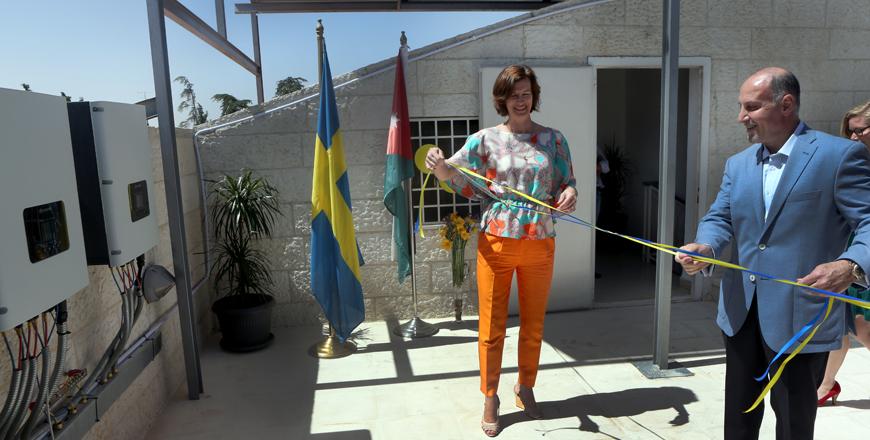You are here
Swedish embassy goes solar, encourages other embassies to follow suit
By Mohammad Ghazal - Jun 04,2015 - Last updated at Jun 04,2015

Swedish Ambassador Helena Gröndahl Rietz inaugurates a solar power project at the embassy premises on Thursday (Photo by Abdullah Ayoub)
AMMAN — The Swedish embassy in Amman on Thursday launched a solar power project that will generate 90 per cent of its annual electricity needs.
The project, which entailed the installation of solar panels on the embassy’s rooftop, will spare the environment 70.8 tonnes of carbon dioxide on a yearly basis and save the embassy around JD19,000 per year, Swedish Ambassador Helena Gröndahl Rietz said at the inauguration of the project.
The Swedish diplomat said the return on investment for the project will be in around two-and-a-half years.
She added that the switch to solar power is part of Sweden’s commitment to a sustainable and cost-effective use of energy.
Highlighting her country’s success in the field of renewable energy adoption, the ambassador said 51 per cent of Sweden’s energy comes from renewables, including biofuel and hydropower.
“I encourage all embassies in Jordan to implement similar projects… Jordan is rich with sunshine around the year and this is an important, local, cheap and environment-friendly source of energy,” the ambassador told The Jordan Times after the launch.
The embassy plans to reduce power consumption in order for all its energy needs to be reliant on the electricity generated from the solar panels.
Gröndahl Rietz added that the embassy is now in line with Sweden’s overall sustainable energy strategy.
“It is a milestone for the embassy and I am proud that we are contributing to decreased carbon dioxide emissions in Jordan and also saving Swedish tax payers’ money with lower electricity bills. I am also encouraged by the increased focus and investments in the field of renewable energy here in Jordan,” she said.
Sweden is the first country in Europe to meet the renewable energy targets set by the EU for 2020, eight years ahead of schedule, according to a statement distributed by the embassy.
About 51 per cent of Sweden’s national supply of energy now comes from renewable sources. This is mainly thanks to hydropower and biofuels. In line with EU policy, Sweden has three main goals in the field of energy, according to the statement.
By 2020, at least 50 per cent of total energy consumption should come from renewable energy sources, with the transport sector meeting the renewable energy target of at least 10 per cent of consumption.
Also by 2020, energy efficiency should increase by 20 per cent.
Related Articles
AMMAN — Prime Minister Abdullah Ensour on Wednesday met with Sweden’s Minister for Public Administration Ardalan Shekarabi, who is currently
AMMAN — Though Jordan’s energy sector strategy, announced in 2020, set a goal to raise the percentage of renewable energy contribution to el
Members of the Lower House’s Palestine Committee on Monday met with Swedish Ambassador Helena Rietz and reviewed ways to boost parliamentary cooperation.
















